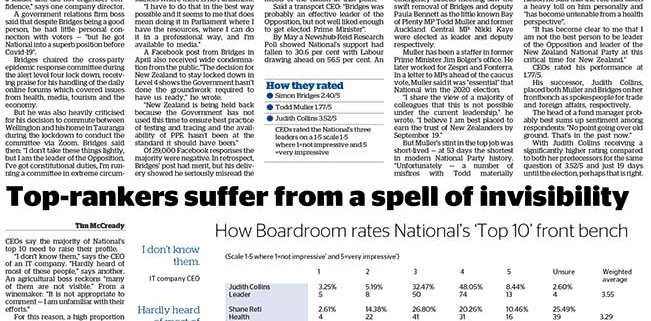Mood of the Boardroom: CEOs grade the National leaders (NZ Herald)
Collins tops the poll, Muller’s appointment is seen as a mistake, but there is praise for Bridges’ performance
National enjoyed stable leadership, with John Key serving just over 10 years, followed by Bill English, serving one year 77 days until he stepped down just months after the 2017 election.
Tauranga MP Simon Bridges was chosen to replace English as National leader in February 2018. He battled poor individual ratings but maintained popularity for National at around 40 per cent in political polls until the Covid-19 pandemic struck.
In the Herald’s 2020 Mood of the Boardroom survey, CEOs gave Bridges’ leadership of two years 85 days a rating of 2.40/5.
“Bridges was highly ineffectual as a leader and did not engender confidence,” says one company director.
A government relations firm boss said that despite Bridges being a good person, he had little personal connection with voters — “but he got National into a superb position before Covid-19”.
Bridges chaired the cross-party epidemic response committee during the alert level four lock down, receiving praise for his handling of the daily online forums which covered issues from health, media, tourism and the economy.
But he was also heavily criticised for his decision to commute between Wellington and his home in Tauranga during the lockdown to conduct the committee via Zoom. Bridges said then: “I don’t take these things lightly, but I am the leader of the Opposition, I’ve got constitutional duties, I’m running a committee in extreme circumstances where there is no Parliament.
“I have to do that in the best way possible and it seems to me that does mean doing it in Parliament where I have the resources, where I can do it in a professional way, and I’m available to media.”
A Facebook post from Bridges in April also received wide condemnation from the public.“The decision for New Zealand to stay locked down in Level 4 shows the Government hasn’t done the groundwork required to have us ready,” he wrote.
“New Zealand is being held back because the Government has not used this time to ensure best practice of testing and tracing and the availability of PPE hasn’t been at the standard it should have been.”
Of 29,000 Facebook responses the majority were negative. In retrospect, Bridges’ post had merit, but his delivery showed he seriously misread the mood of the nation at that point.
Said a transport CEO: “Bridges was probably an effective leader of the Opposition, but not well liked enough to get elected Prime Minister”.
By May a Newshub-Reid Research Poll showed National’s support had fallen to 30.6 per cent with Labour drawing ahead on 56.5 per cent. An emergency caucus meeting saw the swift removal of Bridges and deputy Paula Bennett as the little known Bay of Plenty MP Todd Muller and former Auckland Central MP Nikki Kaye were elected as leader and deputy respectively.
Muller has been a staffer in former Prime Minister Jim Bolger’s office. He later worked for Zespri and Fonterra. In a letter to MPs ahead of the caucus vote, Muller said it was “essential” that National win the 2020 election.
“I share the view of a majority of colleagues that this is not possible under the current leadership,” he wrote. “I believe I am best placed to earn the trust of New Zealanders by September 19.”
But Muller’s stint in the top job was short-lived — at 53 days the shortest in modern National Party history. “Unfortunately — a number of misfires with Todd materially challenged through time in the role,” says Deloitte CEO Thomas Pippos.
These included criticism of a lack of diversity on his front bench, distractions over his Donald Trump ‘Make America Great Again’ cap, and the leak of confidential information of Covid-19 patients to media by former National Party president Michelle Boag and National MP Hamish Walker.
A company director said it is difficult to assess Muller because “he was obviously in the middle of a toxic and tumultuous period for the party.” Another wrote he “was pushed by inexperienced colleagues and self-serving advisers into a job he wasn’t up to and that mistake severely damaged National.”
At the time of his surprise resignation he said that the role had taken a heavy toll on him personally and “has become untenable from a health perspective”.
“It has become clear to me that I am not the best person to be leader of the Opposition and leader of the New Zealand National Party at this critical time for New Zealand.”
CEOs rated his performance at 1.77/5.
His successor, Judith Collins, placed both Muller and Bridges on her frontbench as spokespeople for trade and foreign affairs, respectively.
The head of a fund manager probably best sums up sentiment among respondents: “No point going over old ground. That’s in the past now.”
With Judith Collins receiving a significantly higher rating compared to both her predecessors for the same question of 3.52/5 and just 19 days until the election, perhaps that is right.



